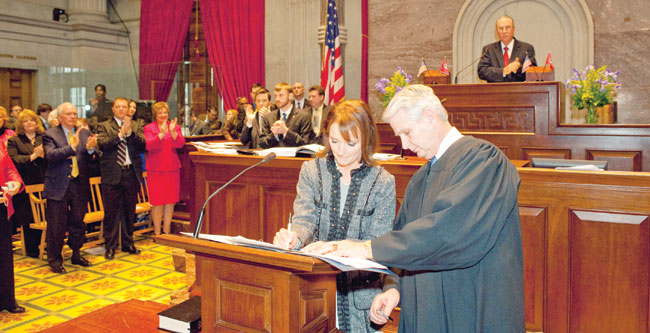
Beth Halteman Harwell, one of the most powerful and politically connected women in the state of Tennessee, began her political profession in the classroom.
A Pennsylvania native, Harwell came to Nashville to attend David Lipscomb College. Though she took a keen interest in the political process, she was not interested in the usual path to politics. “I didn’t want to become a lawyer,” she says. “I didn’t want to be around criminals and criminal law, and corporate law didn’t interest me.
“I knew from an early age that I wanted to be a teacher,” Harwell says. “I really loved the teaching of political science, and, of course, Peabody has a world-renowned reputation for teachers. I thought, ‘That’s where I’m going to go.’”
After earning master’s and doctorate degrees in social science education, she spent a few years training government officials across the state. “And then a position came open at Belmont University to teach, and that’s where I ended up. I taught full time at Belmont for four years, and since that time, I’ve done part-time teaching here and there,” she says, “but my speaker position keeps me busy right now.”
Now serving her 12th term in the Tennessee House of Representatives representing District 56, which includes part of Davidson County, Harwell was elected speaker of the house in 2011 in recognition of her political acumen and service to her constituency.

She finds that her coursework at Peabody has served her well throughout her career. One of her least favorite courses, statistical analysis, has turned out to be one of the most beneficial.
“I’ve actually used that course quite a bit,” she admits, “because a lot of what I do is look at the data that drives the decisions we make in public policy, so that background in statistical analysis has been very helpful to me.”
During her career she has served on the faculties of Volunteer State Community College, Trevecca College, Belmont University, David Lipscomb University, the State Board of Regents, and the University of Tennessee Center for Government Training, among others.
Her teaching skills help her to present complex public policy issues in understandable terms to both her constituents and colleagues. “I think that a very important skill I learned was how to take questions from an audience,” she says. “That’s served me well talking to groups. And, when you’re a teacher, you certainly learn how to take questions from your students.”